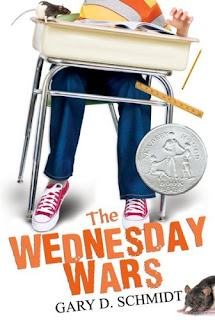 Have I mentioned enough times that I love precocious, young female protagonists? I don't care if their expertise and eloquence are over the top, I like them a lot. Flavia de Luce fits right in with my favorites! She is 11, growing up in England in a sprawling mansion, and loves chemistry. She has discovered a well-stocked laboratory from an ancient uncle, and has made it her "sanctum sanctorum." Throughout the book she interprets and relates to happenings in terms of chemistry.
Have I mentioned enough times that I love precocious, young female protagonists? I don't care if their expertise and eloquence are over the top, I like them a lot. Flavia de Luce fits right in with my favorites! She is 11, growing up in England in a sprawling mansion, and loves chemistry. She has discovered a well-stocked laboratory from an ancient uncle, and has made it her "sanctum sanctorum." Throughout the book she interprets and relates to happenings in terms of chemistry. Flavia has two older sisters, one a book worm and the other lovesick. The interaction between them is entertaining. Her mother tragically died, and her father, an avid stamp collector, is reclusive and disconnected from his daughters. The mystery begins when a dead bird is found on the back doorstep with a postage stamp stuck on its beak. (See cover illustration.) Next Flavia discovers a body in the cucumber patch. Being a child she is questioned, but not let in on much. So she begins an investigation of her own. She takes off on her bike, named Gladys of course, and solves the mystery.
The story is sometimes out there, and maybe not entirely realistic. But it is a great mystery, has fun dialouge, endearing characters, and it is nicely resolved. I liked reading it. Griffin, who is 11, tore through it too, and was excited to discuss it with me along the way. It is murder mystery, and I recommend it!
Here are some of Flavia's great lines:
About reading her first chemistry book, "Within moments it had taught me that the word iodine comes from the word meaning "violet," and that the name bromine was derived from a Greek word meaning "a stench." These were the sorts of things I needed to know!"
When she found the town library was closed, "It occured to me that Heaven must be a place where the library is open twenty-four hours a day, seven days a week. No...eight days a week."
"Wrapped up in the music, I threw myself into an overstuffed chair and let my legs dangle over the arm, the position in which Nature intended music to be listened to, and for the first time in days I felt the muscles in my neck relaxing."
This is gross, but she's describing the linoleum floor in a retirement house. "Whenever I stepped on one of its pustulent brown blisters, the stuff let off a nasty hiss and I made a mental note to find out if color can cause nausea."
I can totally relate to her explanation of how to solve a problem or remember something. "I could feel an answer to the question nibbling at the hook I'd lowered into my subconscious. Don't look straight at it, I thought, think of something else--or at least pretend to."
Oh, I almost forgot. The title comes from this quote:
Unless some sweetness at the bottom lie, who cares for all the crinkling of the pie?
Wiliam King, The Art of Cookery (1708)
Clever, I thought.





